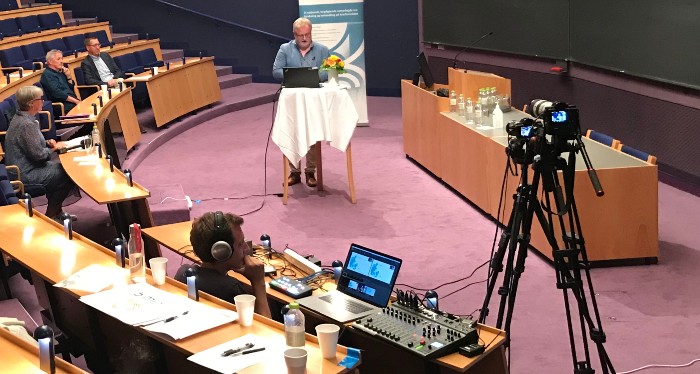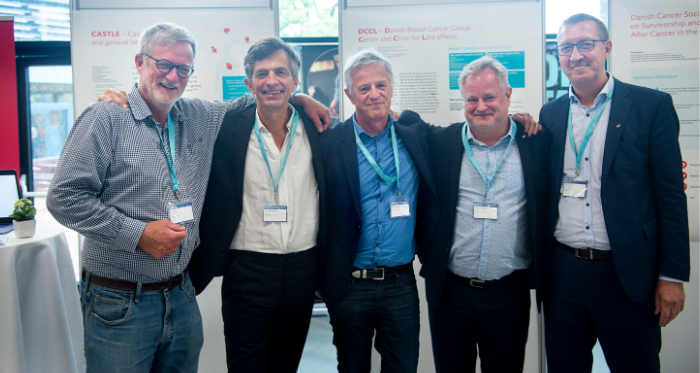
21-10-2020
More than 150.000 Danes live with late effects after cancer and now they can converse with some of the most skilled, Danish medical doctors and researchers in the field of late effect.
In the last two decades, a massive effort on faster diagnostics and improved cancer treatment has been initiated in Denmark, resulting in more than 60 percent of cancer patients surviving cancer. Thus, 300,000 Danes have gone through cancer treatment and are now on the other side.
Unfortunately, over half of previous cancer patients get significant late effect in relation to cancer and cancer treatment. Late effects can manifest both physically, mentally, and socially, as well as have prominent consequences for former patients and their spouses.
Consequently, Danish researchers and oncologists organise a series of talks on late effect specifically targeted at previous and current patients and their relatives. The project is called "No one should be left alone with late adverse effects after cancer treatment" and receives 200,000 DKK funded by DCCC.
The series of popular science talks is a collaboration between the three national research centres: CASTLE – Cancer Survivorship and General Late Effects, Centre for Research on Survivorship and Late Adverse Effects After Cancer in the Pelvis Organs, and National Center for Breast Cancer Survivorship.
Late Effects Group is also part of the initiative and contributes with funding, patient cases and feedback due to the organisation's great and competent knowledge on what troubles those who experience late effects.
Large interest in late effects talks

The three national centres on late effects' head of centre behind the popular science talks, who will address both psychical and psycho-social late effect after cancer. From the left: Søren Laurberg, Christoffer Johansen, Bobby Zachariae, Peter Christensen and Peer Christiansen. Photo: Hung Tien Vu/DCCC
In August, more than 1000 viewers followed the DCCC live-streamed popular science talk on late effects after cancer. The talk was initiated by Late Effects Group, the three national research centres together with DCCC. Such big interest expresses the need for more information targeted patients and relatives.
The project "No one should be left alone with late adverse effects after cancer treatment" will live-stream talks on late effects after cancer each quarter. The talks will present the newest Danish and international knowledge, formulated in an understandable language.
The talks will enable previous patients to improve their knowledge on late effects after fighting cancer and by doing so, supporting and guiding them to better self-care and everyday life management.
Further, the talks will emphasise the areas, where it is important to early detect undesirable effects from a treatment, so matters can be made before chronic conditions occur. Many late effects like diarrhoea, faecal- and urinary incontinence and lymphedema, can currently be treated or eased.
Some cancer survivors are in time, more vulnerable to other physical diseases, like cardiac diseases, due to their previous cancer treatment. Awareness is therefore crucial.
It is also important to stress attention on other psychical manifested diseases like cardiac diseases as some cancer survivors, due to their treatment, are more vulnerable to in long term.
Danish Researchers to inspire abroad
Danish researchers are in the lead of research and comprehension of late effects after cancer. The researchers' effort has given considerable insight into patients' illness and late effects management after cancer. Now it is known that late effects after cancer rarely hits one organ, but are a result of simultaneous damages on several organ systems.
Today we know that the most common psychological late effects, regardless of cancer type or treatment, are long-term tiredness, pain, sleep disturbance, depression, fear of relapse and memory and concentration disturbance.
In addition, we are now aware that physical late effects are more dependent on cancer types and treatments. A lot cancer survivors experience more than one late effect, where each late effect can aggravate and maintain other late effects.
However, a lot is still unknown. The three national research centres hope that an even stronger national focus and improved international attention will result in more knowledge on late effects – and thereby a better change to diagnose and treat in the future.
